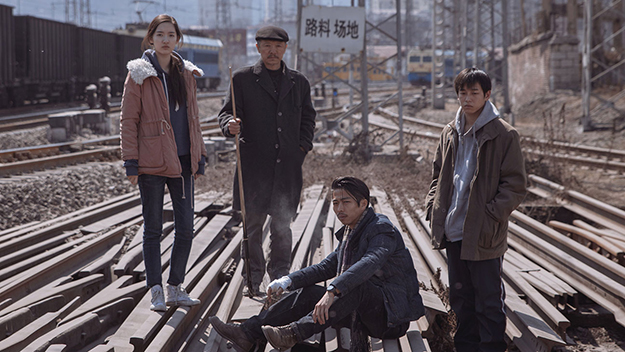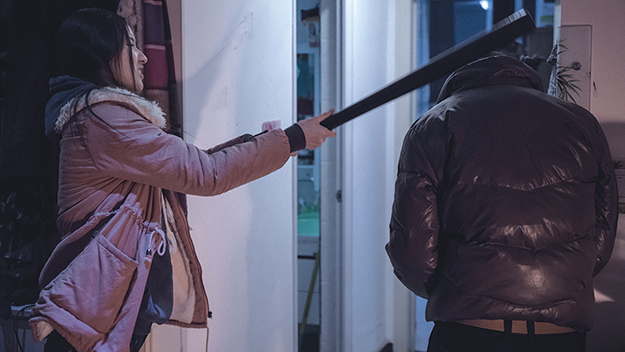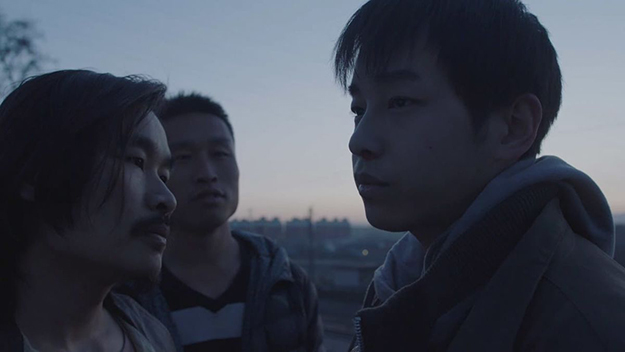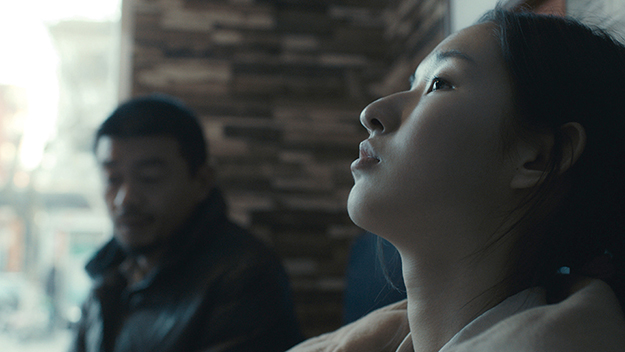At the end of Hu Bo’s An Elephant Sitting Still, you’ll hear a strange sound that possibly gives the film its ultimate meaning—although what that might be is up to you. Do you hear a cri de coeur of despair? A trumpet call of redemptive defiance? Or perhaps a blast of the proverbial sound and fury signifying nothing—nothing, that is, other than the brute indifference of the universe? How you interpret what you hear may depend on your knowledge of the backstory to this four-hour Chinese drama—the fact that, between the film’s completion and its debut in last year’s Berlin Film Festival, writer-director Hu Bo killed himself. That this turned out to be the first and last film from this strikingly original talent would have been powerfully resonant however Hu had died. Given the facts, though, it’s inevitably tempting to read the film as some sort of suicide note, as an expression of a desperation that envisaged no remedy. If that’s what you’re looking for, you’ll find no shortage of evidence in a film built around four deaths (one accidental, one canine, two suicides); in its final moments, a character yells at the people around him (and essentially, at the entire world), “You are all going to hell!” Indeed, everyone here seems already to inhabit an earthly hell; yet the journey that some characters take in its closing stretch suggests some hope, insofar as they’re at least curious enough to go and take a look at an unfamiliar corner of their desolate world. One thing that you shouldn’t expect from An Elephant Sitting Still is some artless, ragged cry of rage: despite its bleakness and its visual and tonal austerity, this is a film of extraordinary beauty, invention, and grace. It’s also a compelling feat of storytelling from a filmmaker who had previously established himself as a novelist (under the name Hu Qian). The setting is a northern Chinese industrial town that’s not merely on the skids, but seems to be grinding to a halt in a slow spiral of entropy. In its near-deserted greyness, it resembles one of the desolate Hungarian townships of Béla Tarr’s films. Indeed, Hu was briefly a student of Tarr, traces of whose influence are visible, and not just in the film’s overall duration and commitment to long takes. The film interweaves the paths of four characters over a single day. Wang Jin (Liu Congxi) is an elderly man whose daughter and son-in-law want him to move into a care home so that they can raise their little girl comfortably in his apartment; the child is his solace in life, along with his dog, but calamity strikes when the animal is killed by another mutt, whose owners prove remarkably unsympathetic to Wang’s loss. Huang Ling (Wang Yuwen) is a teenage girl whose secret liaison with her school’s married vice-dean is about to become public knowledge as a result of a video that’s circulating among her peers. Meanwhile Huang Ling’s classmate and admirer Wei Bu (Peng Yuchang) is in trouble with school bully Yu Shuai, because he has stood up to him in defense of his best friend. When Yu Shuai comes off worse in an after-school stand-off, Wei Bu makes himself scarce, knowing that the bully’s brother, local hoodlum Yu Cheng (Zhang Yu), will come after him.
As for Yu Cheng—a seemingly bloodless fop, with a pencil moustache and a floppy forelock that makes him ice-cool kin to the haunted bad boys of films such as Days of Being Wild or A Brighter Summer’s Day—he has problems of his own. He’s first seen lounging around with a young woman in an apartment; a man enters, sees Yu Cheng, and promptly throws himself out of the window. We don’t see him fall, just dart out of frame before the shot abruptly ends: it’s one of those dynamic “what-just-happened?” moments that Hu, who also edited, makes something of a trademark. Gradually, very gradually, the film lets us piece together the whys and wherefores of this moment: the man killed himself, it turns out, because he realized that Yu Cheng, his best friend, was sleeping with his wife. We later learn that Yu Cheng slept with her because his own girlfriend had rejected him. The man’s death is therefore—Yu Cheng later tells his ex in a quite staggering moment—entirely her fault. This is a film in which people tend not to take responsibility for their own actions. When he discovers that his relationship with Huang Ling is exposed, the vice-dean flips: his career is ruined, he says, and it’s all down to her. When Wang Jin confronts the owners of the dog that killed his beloved pet, they turn nasty, concerned only about their own precious Pipi. It’s also a film in which those who show positive traits—patience, compassion, solidarity—are destined to suffer, and to have their character tested to breaking point. Wei Bu is threatened for defending his friend; pursued after he faces up to his bully; then gets a kicking from the disagreeable dog owner. Little wonder that the persecuted eventually turn. Wei Bu, in a moment of bitter disillusionment, spits abuse at old people; Huang Ling, after getting it in the neck first from her embittered mother, then from the vice-dean’s angry wife, finally lets rip. This happens at the end of a dazzling sustained sequence—12 minutes with two cuts—that takes us through a harsh mother-daughter confrontation, follows Huang Ling out of her bedroom window and down into the street, and then, in a surprise turn, follows her back indoors to vent her spleen. She does so using an object that we’ve glimpsed much earlier, and when she picks it up again here, it comes as a jolt of recognition—and a mark of the meticulous planning and subtle signposting that runs through the narrative. An Elephant Sitting Still is so artfully composed, narratively and visually, that you don’t always notice what’s going on or how cleverly it’s done, but it’s often done by emphasizing certain visual elements while downplaying others—a method that ensures that you’re paying attention. DP Fan Chao often frames two characters tightly, in head-and-shoulders close-ups, before letting us see some crucial detail, sometimes blurred, in the background. In the climactic confrontation scene, everything depends on a figure suddenly appearing in the distance, barely identifiable—unless we remember that one character has always worn a windcheater in a certain shade of red. Hu is a master of concealment, keeping crucial incidents out of view. We don’t see the husband jump out of the window, nor the mauling of the dog: in the latter instance, we just hear a ghastly whining and only then, as the camera moves round Wang Jin, the animal’s bloodied corpse. These are all canny pieces of staging from the point of view of economy and expediency, but they’re also brilliant in that their emotional weight makes these incidents obscene—in the etymological sense of needing to be shown offstage.
This discreet dynamism gives the film its sense of openness and variation, balancing out the emphasis on the town’s claustrophobic oppression, which is conveyed in a prevalence of tight framings and a severely reduced palette: muddy blues, browns, and greys. The use of voices also fits this muted tone. Nearly all the acting is low-key almost to the point of catatonia: Yu Cheng is surely among the softest-spoken hoods in movie history, and the extended Huang Ling sequence mentioned above is so effective partly because of actress Wang Yuwen’s absolute facial impassivity. The exceptions are those few characters whose voices have an abrasive edge of dangerous mania: like Wei Bu’s permanently angry dad, and the callous dog owners. Mostly, though, the characters proceed through the film in a semi-narcotized calm that suggests not so much passivity as stoic tenacity in the face of horror. Adversity they certainly face, and despair: they live in a world without any protective authority that might intervene and give hope. Parents resent their children, adult offspring can’t wait to get rid of their parents, the vice-dean offers his students little consolation when their school is marked for demolition: “When you graduate, most of you will become street food vendors.” When the bully is seriously hurt, the school chooses not to notify the police; the matter will be settled privately, we hear. In reality, that means that Yu Cheng and his thugs will take matters in hand—even though he makes a singularly wan, weary embodiment of vigilante justice. Abject, self-pitying, yet glamorous with his blasé demeanor, Yu Cheng is the epitome of worldly despair, though even he gradually shows a propensity for some sort of redemption. And there is a possible source of higher meaning in this world, although it’s a mysterious one: the elephant of the title, on display in the Mongolian city of Manzhouli, which apparently just sits motionless (Buddha-like, perhaps?) all day, refusing to respond even when visitors jab it with forks. One thing that unites Wei Bu and Yu Cheng is that both are fascinated by this creature, and determined to see it with their own eyes. This legendary creature is this film’s answer to the preserved whale around which the world’s chaos and violence revolve in Tarr’s Werckmeister Harmonies: like that fabulous giant, Hu’s elephant is a hazy nexus of unfixable, possibly terrifying meanings.
Only a couple of elements seem overstated. The declarations of despair can be a little overt (“Life just won’t get any better. It’s all about agony”). And when Wang Jin visits the care home, the camera slowly tracks along a row of dreary rooms occupied by old people barely moving; the use of a melancholy score makes for a too-emphatic poignancy, but it’s the only moment in the film where Hua Lun’s music doesn’t work. Elsewhere, it’s quietly mesmerizing: delicate, sparely lyrical piano, organ, and guitar, with echoes of ’70s German artists like Michael Rother or Popol Vuh. It takes a while before you realize that all the action takes place within a single day; Hu could easily have chosen the title of the other great Chinese discovery of 2018, Long Day’s Journey Into Night. It’s only gradually that we fully realize how adeptly Hu has compressed and expanded time according to his own logic, alternating stretches of stasis with bursts of intensely dramatic action. In a decisive scene near the end of the film, we become aware that evening is drawing in, as Hu pulls off a simple but magical feat of timing: just as a key incident occurs, a train rushes by in the background. Movingly, the film’s closing credits include a dedication to its creator, and a smiling photo of him presumably taken shortly before his death at 29. Like some of his characters, Hu Bo may have decided that he had no future—but there certainly is one for his film, a powerful and original statement, and unmistakably one for the ages. An Elephant Sitting Still opens on March 8 at the Film Society of Lincoln Center. On March 9, join Film Comment for a free talk, featuring actor Zhang Yu; Aliza Ma, head of programming at Metrograph; Dinda Elliott, senior vice president of the China Institute; and Nicolas Rapold, editor-in-chief of Film Comment and host of The Film Comment Podcast. Jonathan Romney is a contributing editor to Film Comment and writes its Film of the Week column. He is a member of the London Film Critics Circle.



